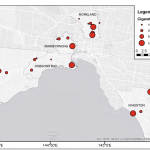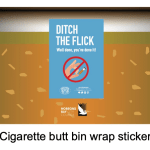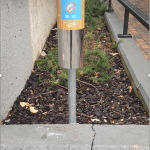Ditch The Flick – Victoria SRP
Source Reduction Plan (SRP) Overview
Name of SRP
Partners Delivering the SRP
- Tangaroa Blue Foundation – created, delivered and lead the SRP
- CleanWater Group: Supported all stormwater drain trap installation and management during project
- Recycling Victoria Communities Fund delivered by Sustainability Victoria on behalf of the Victorian State Government: Provided project funding
- Pipe Management – Servicing of all stormwater drain traps
- Local government areas – with high cigarette associated litter in stormwater drains, assisted with asset funding, council staff engagement, asset management post-project, source reduction project support.
- City of Melbourne
- City of Wyndham
- City of Hobsonson Bay
- Hume City Council – Broadmeadows & Roxburgh Park Vicinity
Location
Melbourne
- City of Wyndham – Werribee Train Station
- City of Hobsons Bay – Hobsons Bay Hotel and Rose of Australia Hotel
- Broadmeadows Central
- Roxburgh Park Vicinity Centre
Photo 1
Evidence of the issue

Photo 2
Evidence of SRP resources

Photo 3
Evidence of positive outcomes

Overall Goals & Background
Targeted Debris
Cigarette Butts
Why is the SRP needed?
According to data from the Australian Marine Debris Initiative (AMDI) database, cigarette butts consistently rank amongst the top 10 litter items affecting locations in Greater Melbourne and its surrounding waterways, including Port Phillip Bay. These butts consistently appear as one of the predominant items during cleanup efforts, especially in urban environments.
Most people don’t want to deliberately pollute the environment, but many don’t realise that whilst the majority of a cigarette is ‘biodegradable’, cigarette filters are made of plastic and it is estimated to take 10 years to degrade into small plastic fibres and remnants.
This is a continuing issue within the marine environment, with particular focus on marine birds who mistake the debris as viable food for their offspring.
Logistics
Timeline and Project Goals
General Timeline: 2019 – 2023
Audits: 2 Phased Audits from 2019 to 2023, 16 auditing cycles
Measuring Success
Once the specialised butt bins were installed, rebranded or repositioned within DOSA’s, the Tangaroa Blue Foundation conducted debris audits via the nearby stormwater traps and observational studies to determine the success of their location. By collecting continuous debris/litter within the stormwater drain traps, we could measure the effectiveness of this SRP within each local government area but also have location specific comparisons.
Assets:
- Specialised butt bins with graphics
- UV Stable directional stickers
- UV Stable co-branded stickers
- Fact Sheet
- Social Media banners and downloadable photos
To grab the attention of our smoking targeted audience, we used brightly coloured, engaging and noticeable prints across all assets and campaign promotion.
We created free downloadable campaign assets and information directed at venues to download and display signage.
Both Tangaroa Blue Foundation and Sustainability Victoria ran social media promotions to generate awareness around the campaign. Once analysed we could see how many views and downloads were made on the website and our media posts.
Data Collection & Reporting
Two phases spanning from 2019 to 2023, involving extensive asset servicing, data collection, and community engagement in 16 cycles. Data was recorded based on the Tangaroa Blue Foundation’s Australian Marine Debris Initiative (AMDI) Database methodology, encompassing 130 data categories, including exact locations and improved accuracy in capturing urban litter types and sources.
Cigarette butts were counted and reported within each audit cycle to enable comparison of Phase 1 & Phase 2 results.
Results and Reflections
Positive Outcomes
This SRP was welcomed and supported by the local government areas involved particularly the City of Wyndham, venues and also members of the public.
Assets:
- Specialised butt bins with graphics
- UV Stable directional stickers
- UV Stable co-branded stickers
- Fact Sheet
- Social Media banners and downloadable photos
Following invaluable dedication, 165 volunteers participated in community auditing events, sorting and counting the trap contents. An online community forum was held to present the findings in both 2020 and 2023 with 130 participants.
Tangaroa Blue Foundation made 2 posts across our social media platforms Facebook and Instagram reaching 1852 reaches with 220 audience engagements and 2 articles posted to the website:
https://www.tangaroablue.org/ditch-the-flick-comes-to-the-city-of-wyndham/
https://www.tangaroablue.org/cigarette-butt/litter-hotspot-program-vic/
Further media posts including a Youtube video, Litter Hotspots Program – No Butts About It, created by Metropolitan Waste and Resource Recovery group and website articles by Sustainability Victoria and the City of Wyndham:
https://www.youtube.com/watch?v=0qbI4uiiNcQ
https://www.sustainability.vic.gov.au/news/news-articles/stopping-marine-litter-at-the-start
Funding
Budget: TBC
Community: Following priceless devotion, 165 volunteers participated in community auditing events, sorting and counting the trap contents between 2109-2023.
Challenges & Improvements
It proved challenging to contact the right person with authority within venues surrounding the stormwater drain traps. This resulted in only half of the implementation plan completed.
Future Opportunities
There is a huge opportunity to expand the ‘Ditch The Flick’ campaign in other cigarette butt hotspots within urban and coastal areas within the Greater Melbourne Area & waterways potentially leading into the Port Phillip Bay.
Once implemented the stickers and signage remain in place to hopefully remind and engage smokers to dispose of their cigarette butts correctly.






